#like... isn't the point of making those decisions to experience the consequences....?
Explore tagged Tumblr posts
Text
Right, stumbling out of my too busy coma to talk more about pulling your punches with writing. I've tried to describe this several times with other writers, and get a lot of blank looks because my definition of words is hodge-podge of also vaguely wrong definitions.
What I mean by "pulling your punches" is holding back and avoiding the hard choices. This is both in terms of character and plot. As much as we joke about torturing our characters, sometimes it is hard to make them go through the most difficult thing because we like our characters, and we want the readers to like them too.
In contrast, it's much easier to make those choices in fanfiction, because they're not really "our" characters. We don't bear the responsibility of what happens to them in original narrative. (Yes, I realize I am talking about totally made-up, not real people. Bear with me.)
The tricky thing is determining when you are holding back. Often this takes the advice of a beta reader, but sometimes they can't always help, because only you know what you're holding back on, and half the time you're not aware of doing it. Hard!
When you're editing your scenes or going over your outline, take the time to consider the worst-case scenario in each one and the following consequences. You're not going to always go with the most extreme option, but laying it out can help you see if your current scene feels to weak.
Another thing to remember is that this often comes up because your characters wouldn't want to experience that. When you're trying to write them as true to their character, you can also unconsciously shield them from choices, consequences, and realizations they need to face. If it feels like your character isn't progressing (or a beta reader points that out), going back and yanking away what's shielding them.
You're only going to be able to determine this on your own story, but let me give you an example of mine. A critical part of my plot is my main character realizing her father is a bad person and she can't live with him anymore.
This sounds easy to do, but I have a lot of sympathy for both characters. The MC's father is facing terrible decisions and acting in the belief that he's protecting his daughter. The MC has spent her whole life with only her dad to rely on, and life without him seems far more frightening.
This took years to untangle. I spent too many drafts where the MC would not fully confront her father about his failings, because I never had her admit them in the story. I had to put the book away and write two other ones before I could look at it again and realize the obvious: the MC had to directly confront her father and fully commit to leaving him. Every other issue with the book fell in line once I figured that out.
If you're stuck on this and spinning your wheels like me, getting feedback on your story is the most helpful way to see the flaws in it. If you're not able to get that feedback, going through and asking yourself "How do I make this situation worse?" for both the plot and the character can help you pinpoint those missing steps.
137 notes
·
View notes
Text
one part of BG3 that I appreciate a lot (and feel like I don't see mentioned quite enough) is just how many different ways there are for the companions specifically to break up with the player, or for them to openly say that though they love the PC, they either cannot abide by whatever it is they're doing/have done, or that they know that there isn't really a chance of a happily ever after for them.
the characters having their own morals, and actual, strict boundaries that are immutable and which they abide by, that's always really nice to see, and I feel like it's not quite as common as I'd like it to be.
like, sometimes I feel like in certain big or popular games, the players are kind of... coddled, in a way? either by not being given the option to do heinous shit (and thus there not being a need for them to experience consequences), or by negative consequences to actions being written in a way that makes them inconsequential, or avoidable altogether. I like that this time, there are things for which that's simply not the case.
every time I see someone be like "I did this thing that this character told me they hated, and they DUMPED me for it! that's so stupid!" I always just feel glad that the characters were written mostly to stand up for themselves, even if it's against the player. that's just always really nice.
#squirrel plays bg3#astarion especially has like what... 3-4 different scenes? that can trigger of him breaking up with you?#and all of them are very reasonable and like... yeah yknow what that's understandable#very “well what did you expect was going to happen”#that AND the levels of SALT certain types of people produce when their in-game boo won't just let them do whatever with no repercussions?#that too is just delicious#here let me do this straight-up heinous shit; but oh no not the quencies!!!!!!#like... isn't the point of making those decisions to experience the consequences....?#well this. this is one of them#(yes I just saw a short of the breakup if the player forces sex in act 2)#(yes internally I hoot and holler; way to go you funky fella YES dump that asshole!!!)
17 notes
·
View notes
Text
Defending Ending 2
Okay I've seen a lot of discourse around the "True Ending" of Clinical Trial and I just wanted to give my take on it. Spoilers under the cut
I know a lot of people didn't like Ending 2's light and happier tone and it being the True Ending and felt like it absolved Lee of any consequences and just put Angel in a dangerous shitty position, isolated with a murderer and argue that it goes against the whole point of the game… But I just really don't view it like that. To me, Ending 2 reinforces some of the game's central themes surrounding consent, neurodivergency and societal neglect.
While I do think Lee can be manipulative (ESPECIALLY in the Reject route) and consistently hides things from Angel, I do think the Accept route that leads into Ending 2/the True Ending is a product of Angel's own anatomy as much as Ending 1 is. While Angel chooses to forgive him initally for the shrine thing, they don't dismiss or downplay what he did either. While they do display some unhealthy thought patterns (the idea that they never thought someone would ever pay so much attention to them <- which is a belief absolutely fueled by self hatred) that could contribute to their forgiveness, they don't let that blind them from the inherent fucked upness of what Lee's done. This isn't a "Wow, you did nothing wrong. Let's date!" situation. It's a "You fucked up and you hurt me but I'm willing to give you another chance, if you change for the better" situation.




Same thing with the revelation of the murder. Angel does not downplay how upset they are to appease him. Even when they acknowledge Lee killing Brandon probably prevented him from harming future victims as he's a repeated offender who likely wouldn't stop, Angel still acknowledge that Lee didn't know that when he killed him. Angel is consistently able to voice their grievances with him and call him out on the wrongness of his actions, which is why I feel pretty comfortable stating that Lee and Angel's relationship, no matter how fucked up, toxic or unhealthy, is not an abusive one because Angel is always able to voice their issues with him and he is more than willing to listen.




The player, and by extension, Angel is also explicitly given the choice on whether or not to forgive him with both revelations (I especially like that Angel's given the choice to basically back out of the relationship, even after they accept the shrine thing, after the murder reveal), highlighting their agency. Yes, you can absolutely argue that Angel's decision to forgive Lee twice is likely influenced by their loneliness and need for connection and that does make their relationship a bit unhealthy (and interesting/hj) but again I don't think it's abusive.
I also want to point out that even if the Accept route, Angel gives Lee conditions. They don't just accept him willy-nilly. They want him to actually listen to them.






I think that Angel's ultimate decision to forgive Lee isn't just to date him, it's to give him another chance at becoming a better, more rounded person. A large part of the whole game is about how society (the education system and the medical system) tends to fail neurodivergent people, especially those most in need of help. Angel and Lee literally bond over their different experiences of neurodivergency (or implied neurodivergency on Lee's end) and how ultimately society failed both of them (with neither of them managing to succeed in ways they wanted because the system wasn't built for people like them).
There's also the prevalent mentions and implications of past punishments that we can observe through some of Lee's dialogue. He's canonically an ex Mormon, who was probably consistently punished (and abused) for any wrongdoing (some of which we can assume could come down to traits of his neurodivergency as it's not too uncommon for autistic children to get misunderstood and mistreated). Similarly, we know that Angel was put some level of physical abuse and mistreatment by their school in an attempt to "correct" their left handedness and even then it's implied that's only one example of them being abused by the education system.



Both Lee and Angel know what it's like to be punished and hurt after displaying a 'weakness' or a mistake. They've both been hurt by the notion that punishment is necessary to improve a person, which is why I find the Accept route so powerful. I've seen a lot of people complain that Lee doesn't go to jail or face "tangible" consequences but the way I see it, prison would make him worse and remove any chance he has of healing. While fucked up, illegal and his fault, his actions are still partially a product of his upbringing and the lack of support and therapy for him. He specifically mentions that he never went to therapy so he could get his job. Lee is partially the product of an unaccomodating society as much as Angel is. (Also I could go on for hours about how his Mormon upbringing probably skewed his entire view on how relationships are supposed to function and probably made him think love has to be in the form of devotion)
The way I interpreted it. Angel wasn't coerced into staying with a dangerous, harmful person. Angel sees parts of themselves in Lee and is giving Lee a chance neither of them were ever given in a life. They're creating a new life together where mistakes and fuck ups aren't instantly met with punishment or harm. Yes, Lee fucked up horrendously, violating their trust and ignored their wishes but they're both willing to acknowledge that and work on it because maybe for once, one of them's allowed to fucked up without facing an abusive 'punishment' afterwards. Maybe for once, one of them's allowed to fuck up and be given room to grow and improve. And maybe for once, Angel gets to choose how they want their life to go.
No, most people probably wouldn't have made the same choices as Angel but its still their decision to make. Yes, it's likely influenced by their pre existing loneliness and trauma. Yes, Lee would have to put a lot of work in to change himself and that will take time and there's likely some unhealthy beliefs he'll always struggle with. Yes, Lee and Angel's relationship is far from conventional or completely healthy, but fuck man, I think they're giving eachother room to figure it out together and idk, there's something beautiful about that to me.
They're both very mentally ill but they're trying and there's something about that that I find oddly comforting. Most media with the yandere trope never really provide the option for the yandere character to actually try to reflect on their actions and maybe learn better ways to cope and honestly I was so sure that both endings would involve someone dying in some way because these types of stories don't tend to go well. Usually, after a certain point, a character's just framed as "too" far gone, "too" mentally ill, "too" fucked up and beyond saving and they usually die a tragic or poetic death (i.e like Ending 1). But Angel looks at Lee and his actions and decides fuck it and to say no to that. They make the choice to give Lee another chance any way after what he's done because they don't see him as irredeemable. I just really like the way they both get to live in the end and make a better life together and what that says about neurodivergent and mentally ill people.
#ALSO. I feel the need to say. I do like Lee's fucked upness. I think it adds a lot to his character. I just also feel like the game doesn't#exactly glorify those traits of his (unlike what some ppl have said) and treats them more like things he needs to work through#clinical trial#clinical trial game#angel martinez#lee smith#<- feel like i couldve also touched on how lee's one of the most RELATIVELY palatable and decent yandere esque characters ive ever seen lik#and how he feels a lot more grounded in reality <- tbh i totally understand why someone would be uncomfortable by his character. i just.#disagree with a lot of the discourse around the ending that i feel ignores some of the nuances#txt#clinical trial ending 2#clinical trial true ending#analysis#angelee#meta#????
471 notes
·
View notes
Text
Sky and Viktor's relationship is such a horror movie to me. You've got a man who was frustrated by the limitations placed on his life that were out of his control, like his class, mobility, and general health. Despite everything, he manages to rise beyond his station and avoid being an assistant for the rest of his life.
Then you've got a woman from the same background who admires him and all that he's accomplished in spite of the similar class based prejudices they faced all the while she's his assistant. She works up the courage to take leap of faith and reach out to him with her own research to show what's possible if they worked together as equals. And then he gets her killed!
Sky's death isn't the end of it because while it affects Viktor it is in no way meaningful to Sky's life or value as a person whatsoever. Even the pendant he wears in her memory is based on the design of her notebook, but that was just her notebook's cover, she probably bought it from a store and the design itself is probably mass produced. Why not use Sky's signature that was in her letter and in the notebook, the thing part if the notebook with real value?
Then Sky's brought back in s2 and she really only exists to be Viktor's assistant again, who he kills, again! But this time it's different because this time Viktor's making a conscious decision to look Sky in the eye and kill her... to prove he's changed.
In the middle of all this, in no way has Sky's death been mourned by her family or anyone else who could have known her. Jayce wasn't affected by the reveal, he didn't think it was important to tell Heimerdinger, or anyone who knew her. Nothing about her life, death, or disappearance has spurred any emotional reaction or even curiosity about what happened to her.
Sky's new life was also extremely isolated because she became further tied to him (in some ways you could say she was defined by him). Viktor never mentioned Sky to anyone in the material plane during his commune arc, so she only exists to him and she has no way to communicate with others, she's just there for Viktor's sake.
Then in the finale we learn this all a part of a big time loop where Viktor actively set the wheels in motion to have him and Jayce create hextech together, but if everything follows as is, that means Sky is violently killed in those timelines too. That means Viktor weighed the costs and decided over and over and over again that Sky was expendable enough to let her die for his plan to work eventually. How is that not murder at this point?
What's worse is that post-finale Sky's humanity is a point of dispute amongst the fandom, the VAs, and the writers themselves. Sky's the hexcore manipulating Viktor. No, Sky's a manifestion of Viktor's guilt. No, she's actually supposed to represent his humanity/conscious made physical. And in none of these arguments do they discuss Sky as a person, she's just an object meant to serve Viktor both in the narrative sense and literal sense as his assistant.
The most absolutely maddening part is that with Viktor's new bio on the League site, not only have most traces of Viktor had been scrubbed by Piltover's archive, but Sky's life has been completely wiped. Her death was implied to have been swept under the rug, and only described as the "loss of life" consequence from his Hexcore experiment.
Viktor was afraid of dying a senseless death (created by the conditions Piltover condemned his birth to) in obscurity and then he turned it into Sky's destiny.
#arcane critical#sky young#viktor arcane#how do you write like this and pat yourself on the back like you did a good job#like you wrote something deep#how do you write a level of fridging so insane it takes a franchise comic book character and their legacy of writers to get at#then have an entire movie and tv show created to rectify/deconstruct#that's the kind of story the writers gave sky#and what's worse is they really made it all about viktor#he's condemned her to die across multiple timelinelines as his assistant and then serve him in the astral plane#so he can keep cycling thru his dumb plan#i wouldn't be so angry about it if the show didn’t treat this whole mess as way more saccharine than it should've been#I'm fine when my favs are bad people but i don't think most of this fandom including the writers understand#the gravity of what Viktor's done to Sky#and somehow they didn’t notice Sky was black when they wrote her into very very very specific tropes for black women#arcane meta
399 notes
·
View notes
Text
Loghain Mac Tir is my comfort character. It is not often a pleasant thing to admit, and my reasons are complex, and personal, but fundamentally what makes me so attached to him is how human he is. That kind of depth and complexity is what made me fall in love with Dragon Age in the first place. He’s not just a “noble hero” or an “evil villain,” but a fully realized person who embodies good and evil, and everything inbetween, who is shaped by his past and his deeply personal convictions, his flaws, his fears, his fierce love for Ferelden, and, most importantly his tragic mistakes, that lost him everything, and that is what makes him feel so real to me.
He doesn’t have an easy narrative arc. He’s not driven by simple greed, cruelty, or even by misguided idealism. He’s a survivor with wounds that never fully healed, and those wounds shape the way he sees the world and interprets threats. Every heinous decision and tragic mistake is a direct consequence of his loyalty to Ferelden and Maric, and his willingness to bear the burden of horrific choice. He has been bleeding for his cause since he was a child, and it has turned him into the same kind of cruel and cold tyrant He fought against in the first place, and watching him struggle to hold true to his values, and eventually abandon them, as his path grows darker and more isolating, is this profoundly tragic thing that to me is infinitely more compelling than a classic Hero's Journey.
What Loghain did in the Alienage is deeply disturbing and inexcusable. Using Tevinter slavers to control and exploit the elves is one of the darkest points in his character arc. It’s a choice that reveals just how far he’s willing to go to maintain control and secure his idea of Ferelden’s “independence,” even at the cost of his own morality, so He lets in a foreign power to abduct and subjugate the citizens he claims to be protecting. It unveils the extremes of his desperation and paranoia, because in his mind, he’s protecting Ferelden, but in reality, he’s perpetrating the very kind of oppression he once fought against. It is dark, it is horrific, it is unforgiveable, and that is the whole point.
He has to confront the devastation he’s caused, and he can’t simply brush it aside as a “necessary evil.”. If he joins the Grey Wardens, his path involves acknowledging these grave mistakes, taking responsibility, and finding a way to live with the guilt. There is no reconciliation for his actions, his fear and trauma may explain but never excuse what he did. There is no easy way out. Loghain is stained with the blood he shed forever. He has to live with having failed, with the compounded weight of his actions and regrets, and, if he joins the Wardens, he isn't even granted the mercy of a quick and clean death, and instead is exiled from the country he poured everything he had into.
And doesn't this resonate? Does this not perfectly reflect the difficult reality of being human? How people can be fiercely protective, deeply flawed, and driven by complicated motivations, and that these qualities make them more worthy of understanding, not less? Loghain’s arc speaks to me on such a deep and personal level, especially as someone who has been battling the demons of trauma. His story is a vivid reminder that trauma doesn’t always make us better people, but exacerbates our struggles and can lead us down dark paths. i see parts of my own struggles in Loghain, i understand his pain, his fear, the choices his past self would loathe him for, and the gnawing self-hate, regret and grief.
Trauma twists our intentions like that. Instead of guiding us toward empathy and understanding, it clouds our judgment, and pushes us to make decisions we later regret, and become versions of ourselves we hate. My reality of trauma has not been this character building experience, the way it is often depicted in media, but something harrowing and life-altering, that still poisons me, even years later. But seeing a character lose all tether to himself and get lost in his demons is a tale worth telling, and an experience that still grips me, even 15 years after playing DA:O for the first time. Seeing Loghain live through rock bottom in DA:O, and then, ten years later in DA:I find purpose and whatever semblance of peace is possible in his circumstance, is something that gives me comfort. It is deeply personal, and i keep this unforgiveable and irredeemable, this grief-stricken and regret-filled man, this complicated and multifaceted character deep in my heart.
There are spoilers for datv under the cut. Major spoilers about the end of the game. If you have not played through yet, please don't be tempted to look. i thought i would be fine with spoilers, but i am not. You have been warned.
All of this is rendered moot by the ending of datv. By a throwaway line. i have been spoilered by this online, and have not reached this point in the game myself, yet, but it leaves me feeling a lot of ways, and it hits me hard. It feels like everything i found relatable in his struggle, everything that made him so human, is suddenly taken away. If his actions weren’t truly his own, and he was being puppeteered by old gods magic, then what does that mean for the weight of his choices? It feels like a betrayal of everything that made up his character, a character who has grappled with his trauma and made terrible choices, yes, but ones that were driven by his own will and conviction, always.
The complexity of his journey, the depth of his remorse, and the struggle for a new purpose, all become overshadowed by this new twist. It threatens to erase the beautiful, painful, and human truth of what it means to confront one’s demons and seek understanding in the aftermath of suffering, what it means to reassess and take accountability for your actions and do the hard, dirty, and thankless work of bettering the irredeemable, bit by bit, piece by piece, so that one day you may draw a breath and feel just a bit of that weight eased.
But no, he was just a victim all along. He has no agency, his self-actualisation is lost on him, he was never responsible for himself. It feels like one of Dragon Age's most complex characters has been flattened down into cardboard.
172 notes
·
View notes
Note
Hey Raven! 👋 I don't get all the vitriol about the lack of consequences of Malleus's OB. Twst has never given any serious consequences to any villain so far. Riddle, Leona, Vil and Idia have also tried to kill Ace, Ruggie, Niege and the whole world respectively. Rollo tried to wipe out all magic from the world which would kill entirety of Fae or potentially other magical species. Fellow was involved in human trafficking. None of these people faced any serious repercussions for what they did. If it was done before but not now I would understand the frustration. Among all OB boys Vil & Malleus are the only ones who apologised. Also you mentioned in your book 7 finale post that you were surprised about the lack of death and destruction because of Malleus's UM. But I'm more confused as to why you were even expecting that. Malleus's UM was never meant to cause death or destruction in fact it was precisely to avoid those sad occurrences he decided to use his UM. So it's no wonder there were no deaths or serious property damage out side of NRC. We have already seen Silver as baby sleeping for 400 years by fairy magic and being completely fine. Only danger was the loss of autonomy which thankfully was stopped. Malleus literally had a part of his body mutilated which is the most on the nose consequence we have seen. Yes it was necessary to stop him still doesn't change the fact it is mutilation. Plus I don't think post OB flashbacks were meant to shift the blame to the bv senators. Even though I don’t like them their actions in universe make sense. I think all flashbacks merely explain the OB boy's past experiences and circumstances. It doesn't justify there actions in present only provides an understanding of their motivations and character. Life doesn't exist in a vacuum. Malleus's flashbacks merely explains why he is the way he is now. It doesn't rights his wrongs. People are shaped by their experiences and circumstances. Since not many people can relate to most OB boy's circumstances it becomes hard to empathise with them. I am NOT saying people should not criticise or dislike a character. Just saying that lack of accountability & consequences isn't something unique to Malleus. Lack of control over our my life and circumstances is something I have been dealing with since i was born so I know from experience how suffocating and hopeless it feels. Even if someone understands it doesn't change of help my situation whatsoever. I relate to Malleus feelings about his own situation. It doesn't makes his decision right but I understand his thought process. People can understand other but still dislike them. Understanding does not equals to justifying. I hope I didn't offend any one. My sincere apologies if it came across as such.
Have a good day or night Raven!

Before I get to sharing my commentary, I'd like to make a quick clarification. "Vitriol" (cruel and bitter criticism or outright insulting) is a very strong word to use here. I don't doubt that some people are vitriolic about the ending. However, to label most or all critique as "vitriol" detracts from the discussion, as it paints those not happy with it as blindly hating on Malleus and ignores any plausible points they may have. Let's acknowledge the entire spectrum of reactions, including just... plain disappointment and everything in-between that disappointment and vitriol. It's not all coming from a place of blind hatred or refusing to understand him, some of that critique is very much coming from a place of understanding but still disliking the outcome.
I can't speak for everyone, but I personally haven't seen many people claiming "Malleus and ONLY Malleus should be given severe consequences." Twst has frequently been criticized for the lack of serious consequences for ALL of its OB characters (and its Halloween event characters). I particularly find Playful Land distasteful because they casually never address what happened to the non-NRC victims of the operation. And notably, Idia came close to *checks notes* oh yeah, letting monsters out of hell and causing an apocalypse. Just because Malleus is currently being discussed--as he is the most relevant--doesn't negate the fact that past OBs + Halloween characters were critiqued in a similar way. Few people are denying that the other OBs also did terrible things and only got off with a slap on the wrist. We're not conveniently ignoring past sins, it's just that we're talking about the most recent one now. (Few corrections to some points brought up on this topic though: I believe Riddle apologized as well; it's also NOT canon that wiping out magic would kill fae or other magical creatures, simply because fae are more inclined to magic doesn't mean losing that magic kills them.)
I'm aware that Malleus's intent was not to harm anyone with his UM, and that his UM only put them to sleep. However, I just cannot suspend my disbelief. Even if he didn't mean to hurt people or to cause damage, there surely were potential issues with 20,000 individuals falling asleep mid-whatever activity they were doing. The scale is large enough for there to be a non-zero chance that someone wasn't accidentally injured or even killed. Swimmers? Drivers? People cooking? What about those with preexisting health conditions like sleep apnea and diabetes? And even if we accept that Malleus magically suspended their bodies in stasis, isn't magic limited by one's imagination?? Malleus doesn't strike me as someone who understands a lot about health conditions, technology, etc. How would his magic know to stop cars (something he admits to never having ridden before in A Firelit Sky), to cease bodily demands for care, etc.? The latter (ie bodies atrophying from lack of sustenance) is even mentioned at least twice by the Shrouds as potential threats to their wellbeings. Why would they bring it up multiple times if not to insinuate a fear of consequences??? Yes, Silver was able to sleep unageing for 400 years, but we cannot be certain that magic is the exact same as whatever Malleus was using, or that their imaginations worked the same way. I would find this less surprising if they actually explained how it is that everyone was without injury, like having the Shrouds confirm that the lack of sustenance was not a real issue. Them not addressing the theory at the end only makes me suspicious. If it wasn't a problem to begin with, why even have them mention it more than once? At that point, just don't include the dialogue implying this at all.
I think to just chalk it up to "the only danger was the loss of autonomy which thankfully has stopped" is minimizing potential issues that could result from this. Realistically, it would be a huge problem that the (future) sovereign of a country took such a drastic move; this would surely affect relationships with other nations so I find it strange that this isn't really touched upon. (A similar issue was mentioned by fans with Leona's attempt on Malleus's life in book 2, but again, we're discussing Malleus here because he's most relevant; the lack of realistic consequences for the other characters is an entirely separate problem.) They did bring up Malleus's grandma apologizing and condemning her grandson's actions, but that doesn't go in enough detail--how are the other nations reacting to this??? And again, bringing back the 20,000 statistic--I also find it strange that the writing only mentioned a group of people who loved Malleus's dream magic and make zero mention of any people who were traumatized by it?? Like, you'd think at least a few people would have felt upset, violated, or even confused about the matter??? That's not even counting all the NRC students we had to shock awake, some of which cried or had emotional breakdowns over it. It's strange how the narrative ONLY focuses on reassuring us that Malleus's actions didn't actually affect anything when, given the numbers, it would have, at least emotionally/mentally/psychologically. And how come no relatives were mad about what happened to their kids? NRC (and RSA, I presume) have the children of many prominent families in attendance; you’re telling me none of these people got upset or tried to retaliate? Even though we know some of them take extremes (looking at you, Mrs. Rosehearts)?? I’m not saying I want Malleus to have harmed anyone or to be made a public enemy; I want a more balanced understanding of the consequences of his magic. Like, why isn't there also... I don't know, mention of therapy or social support being provided for those experiencing shock after waking up from the dreams? To help them get back on their feet? I would have accepted even the off-handed mention of something like that.
Again, I'm not speaking for everyone here (I know that some people find damaging a horn to be a "good" way of regulating his unchecked magic), but personally I was pretty squicked by that. I agree that Malleus should have limits placed on his power, but I think it should have been done through some other method like... I don't know, Maleficia magically "grounding" him or something. (Like maybe we struck the horns but it didn't actually chop anything off; his grandma places a spell that limits what he can do afterwards?? Or maybe Malleus himself permanently sacrifices a ton of his magic to Lilia in order to revive him.) I wince a little whenever I see Malleus with that broken horn because I can't help but think of a real-life animal with an equivalent injury. A cat that's been declawed, a ram with a broken horn, a bird with its wings clipped or its beak blown off, etc. It makes me feel really bad for him 💦
I think a lot of people see the broken horn as being the most "severe" of consequences because a part of Malleus was essentially broken. It's visible, unlike mental or emotional scars, and the sad truth is that people are quick to condemn something that's easy to see rather than something that's not (ie potential psychological fallout or trauma). None of the other OB boys have to walk around with a physical reminder of what they did, so Malleus is perceived as being the "most hurt" in the eyes of the fandom. I'm still not entirely sure what the effects are in-universe though??? Like how does this impact his everyday life, what spells is he still able to use, does the area hurt, does it affect his balance or other aspects of his life?? He doesn't seem particularly bothered by it, but that's probably due to the time skip + for plot convenience; it would really help us better understand the fallout if the next main story update elaborated.
Malleus is unique in that he was also never previously held accountable for his actions (outside of book 7). Endless Halloween Night, his general lack of genuine effort to listen to his peers when they tell him off or try to explain why he messed up, actual attempts to harm civilians or mages he knows are less powerful than him... None of it results in real consequences. At most, he gets scolded a little but doesn't truly learn from that scolding, so he's doomed to repeat the same mistakes. It feels like part of the reason why people want Malleus to "face the music" is because he never had his privilege previously challenged. People are too scared to due to his magical might and social status--and now, when he's set before the world's stage, is the most likely time when he'd actually have to look in the mirror and reflect on his past mistakes. Not only the OB, but also his hubris in general. Some people also just feel that Malleus will not grow as a character (as he has demonstrated issues with this outside of book 7) without facing the other repercussions of actions he directly took. No one's calling for Lilia to permanently die because they want to see Malleus suffer. They're saying that if Malleus ended up doing no harm to anyone or anything, if Malleus doesn't have to face Lilia's mortality (the thing he OB'd over), will he really have learned anything in the end? Is there anything pushing his current beliefs or challenging him to change? There's a difference between calling for "more punishment" (which I think is what's being conflated here) and "more accountability". I think most want the latter, NOT the former. Most of us don't want Malleus to be harmed or ostracized further--what we do want is for him to realize that he messed up and to think long and hard about what he can do to make amends. The scale of what he did was grand, so doesn't that also warrant he make up in a similar way? One party and apologizing to a fraction of the people he affected is only accounting for some of it. (For example, I would have personally wanted him to formally address everyone he impacted, not just NRC.)
Mmm... The OB flashbacks are definitely meant to explain, not excuse, the related boy's actions. If it were only Malleus's flashback in isolation, I would have perceived it as such. However, it wasn't just that flashback. It was everything else in the narrative explaining away any potential issues resulting from his magic. It wasn't a few details either, it was several. When you add them all up, it creates... this feeling that the narrative is pushing HARD for you to feel a certain way about Malleus specifically. No other past OB has had so many details thrown our way to reassure us that the OB boy actually did as little damage as possible. We weren't explicitly told the destroyed rose maze was fixed in a jiffy with magic, or that no students were injured when Riddle OB'd. We weren't explicitly told that Ruggie made a full recovery and bears no grudge against Leona, or that his victims healed very quickly. We weren't explicitly told that Azul shoving tentacles down people's throats didn't traumatize any mobs, etc. (And to be clear, I've shared my own complaints about how easily the other OBs were forgiven too, particularly Azul with customers flocking back to his restaurant.) The opposite is true for Malleus, so that it feels a bit… much. We are explicitly told many things and then nudged to not worry about them.
My own issues with the flashback in part stems from worries with the fandom reaction to it. Malleus has historically been a character that the fandom is EXTREMELY protective of, so much so that people are willing to push the onus onto anyone but him. I've literally seen fans blaming Lilia for Malleus not having social skills rather than accept that Malleus being awkward is a combination of factors (factors which include Lilia's enablement but also include Malleus's own learned complacency + not understanding humans). When the flashback opens with the senators blessing Malleus, it (unintentionally) presents fans with an easy target to redirect their anger and pin the blame on. Even if the Twst universe doesn't push all the characters to hate the senators and blame them for Malleus being the way he is, the fans certainly will.
To summarize: very few people are saying "Malleus and Malleus ALONE is experiencing a lack of accountability and consequences." A lot of the current focus on Malleus is because he is the most recent OB, operates on a much larger scale than the other OBs, and has a history of not receiving consequences in other incidents. None of this negates previous critique lobbed at other characters who got off with little or no consequences.
I hope that helps you understand why some Twst fans have such different opinions regarding book 7's conclusion! I also hope that this doesn't diminish your own enjoyment of book 7 or of Malleus's character in any way, just shows you an alternative perspective. I can tell from your passionate words that his story really resonates with you (and there are many others that feel the same!), so that makes me really happy. I wish you guys nothing but the best; please give your lizard boy all the adoration!
#disney twst#disney twisted wonderland#twst#twisted wonderland#notes from the writing raven#question#Malleus Draconia#Malleus Draconia critical#Azul Ashengrotto#Leona Kingscholar#Vil Schoenheit#Rollo Flamme#stage in playful land spoilers#Fellow Honest#Ernesto Foulworth#tw // human trafficking#glorious masquerade spoilers#Riddle Rosehearts#book 7 spoilers#book 7 chapter 13 part 2 spoilers#tw // mutilation#Lilia Vanrouge#Azul Ashengrotto critical#Idia Shroud#briar valley senators
105 notes
·
View notes
Text
Viren: Not the Cliff but the Road
I'm pretty sure that most of The Viren Conversation has been had (and had, and had!), so I don't want to beat a dead (disgraced, former) High Mage. Howeverrrr, there is one element of the way this character finale played out that remains one of my favorite things to come out of the TDP room, and I just want to talk about it a little. (As always, just my take, not canon.)
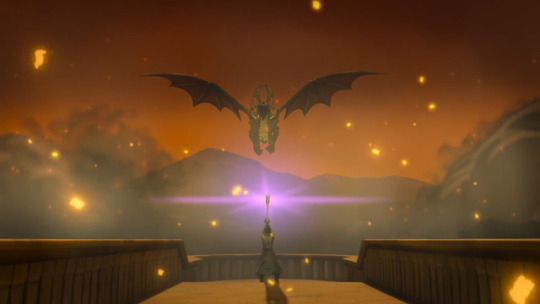
I have a strong personal bias against the idea of death as an inherently redeeming act in fiction. We are so accustomed to the idea that a succesful hero's arc will conclude in sacrifice, and that therefore a reformed villain's arc must end in the ultimate sacrifice, that we don't think to probe the origins of this concept. To me, this is basically just deeply ingrained Christian pedagogy masquerading as narrative fact. I don't personally think that there is anything inherently salvational or goodness-proving about this arc format, or that it should be the natural default for stories like this. Death does not cleanse; life does. So theoretically, I should be unhappy with the way Viren's arc ends in season 6. He -- a bad person -- dies doing a good thing. He sacrifices his life for Soren and the people of Katolis and thus is redeemed.... right? If I thought that Viren's change arc ends with his death, sure. But that's not how I see it. For me, Viren's arc draws to a close before the attack on Katolis, and before his death. I don't actually think he has a singular redemptive moment. Instead, it is the sum total of his choices and actions from 509 to 606 -- the ways he makes use of his life -- that are cumulatively cleansing. Viren has always thought of himself as someone who makes "the hard choices" but he's been pretty good at wriggling (or being wriggled) out of the consequences. As of 509, that changes; he changes. He makes choices that will be painful for him. That will place a burden on him. And that, most importantly, he believes he will have to live with. There is nothing short-term about the decisions Viren makes after that point in the story. They are all the actions of a man who has finally realized that he can (MUST) live with the consequences of his "hard choices." I'd even include choosing not to kill the Homunculus in that category, as the death Viren faces there is a quiet, lonely, and utterly unremarkable surrender -- all things his character in many ways been defined as working so strongly against.
If there is a true peak of his arc, I personally see it as the moment in 606 when Viren burns his letter to Soren. He has gone through the agony of exposing his darkest moments and can move forward with the clarity that such an experience provides. But even more importantly, he chooses not to burden Soren with that knowledge -- and in doing so, accepts that he will live with Soren's anger and blame. He will not justify himself at Soren's expense; he sacrifices any hope of receiving love from his son because he knows those feelings are the cumulative consequence of his own actions. Viren's death is a culmination, if anything, of his love for Soren and his arc of shifting the focus of his life to others. His death does not retroactively prove his goodness, does not justify his past. It is a sad resolution of a man's struggles, nothing more. So I don't see Viren's choice to sacrifice himself as a redemptive act, because I really don't think he needs one. He is doing the work already, living the life, walking the more difficult road. It's bittersweet that the road ends, but they all do. The important thing is, for me, that Viren isn't defined by the act that ends his life, some kind of spectacular salvational swan dive off a cliff. Instead, he is marked by the journey, the change he underwent to get to that point in his story. (And like, I was a very minor participant in the orchestration of this arc, but I'm ridiculously proud to have been a small part of this kind of storytelling.)
#writing#tdp spoilers#the dragon prince#the dragon prince spoilers#tdp#the dragon prince season 6#tdp s6#tdp viren#viren#lord viren#tdp soren#soren#tdp crew
99 notes
·
View notes
Text
The thing about only being able to regulate your nervous system by getting high that makes it so dangerous isn't that it's all negative - like most people don't act crazy when they smoke weed but when you do it as a medicine in that way you will likely be high way more often than is healthy even given person to person experience and also you're more likely to be high during difficult moments in life that probably actually require you to be able to think straight to consider consequences and make big decisions
Regulating the nervous system and getting out of fight or flight has been the main topic of conversation for me this week just learning a lot beyond just the usual tiktok therapist lingo and actually starting to understand some of the foundations of the work and why most healing especially physical really can't get past certain bigger milestones until the body is in a state to accept that change and begin to heal itself the way it was meant to
And when I talk about the importance of being sober from weed I think a lot of people interpret it as far less important than sobriety from alcohol because everyone knows alcohol is literally poisonous to the body where with weed there's lots of tangible benefits like pain reduction etc - but I think that really severely misses the point of why sobriety is really deeply important for a lot of people and how it's not super dependent on the actual substance of choice but why the substance was needed in the first place whether emotionally, physically, or both. And for myself I started smoking super religiously very young because I've always carried an unnatural amount of stress in my body for many different reasons and it was the first thing I encountered that really helped me relax in a certain sense
But the issue is that that's just a log to keep you afloat it's not a real lifestyle change - people who are stuck in that cycle like I was of regulating those nerves and anxieties and even physical clenching by smoking to manually push the body and mind into a different mode when they don't know how else it ultimately comes at a price and although it can be silly and relaxing to smoke it does also make you incredibly passive and complacent to be in that heavily altered head space especially if it's most days or super often like I think it becomes for a lot of people who have come to rely on it for their stress or physical issues
I think it can be a helpful thing the way any coping mechanism is - but at the end of the day it becomes a habit that is reliant on a substance that DOES have a lot of downsides as well, even just the simplest one of not knowing how to connect with your body or maybe never having the initiative to get more meaningful help that I think comes when you are sober and can't rely on escapism the same way and experience the urgency rather than being able to defuse it
I've been thinking about it so much since I've been sober for more than a couple years and really recognizing how hard it is to muster the time and energy for deep healing body work or revisiting the relationship to our nervous system that forms so early in life in a way that's so largely out of our control but I think it's important to talk about it publicly because I think most of society really has this narrative of "do what you gotta do" and I think that itself is sort of an unhealthy "surviving not thriving" type of lifestyle that's reinforced by things that help us not confront the root issues let alone look closely enough to see what they are
I am really incredibly glad I decided to get sober and not spend another day trying to separate myself from my body and even though I can't say look at me I'm safely on the other side of all that suffering because I am only really now taking the steps to be in a safe enough life to do some of that work - I know I didn't see anyone around me my whole life take that initiative let alone be open about that choice and the realities of why they made it
Addiction is a very personal and complicated thing but I think there's a lot to be learned in recovery that's worth the effort
96 notes
·
View notes
Note
Idk how to articulate this but in regards to a lot of defense of certain elements of C3 being that they “make sense” in universe, (Ashton becoming indecisive, the party not knowing each other well because of the little passage of time, the party not having stakes in much of things,) it’s always very misguided because something can make sense in universe and still be a really bad writing decision. Especially if you’re trying to respond to an out of universe criticism with in universe logic.
Correct. I think there are two big problems with these arguments. The first, is as you said, the fact that these Doylist critiques (story poorly structure, party lacks investment) are being met with Watsonian defenses (makes sense for the party). We're saying "the party should have been given a reason for investment in the beginning."
The second is, and I've been reluctant to point this out because the bulk of hate I've gotten has been (largely false and frankly idiotic) claims of hypocrisy. But man is a lot of this hypocritical, the defense of Ashton specifically. Like, yes, Ashton is someone who's had a difficult life and frequently had very little power, so the fact that they do have power now isn't something they are used to. However, and this really is the even larger problem, just because a sentient being has a reason for feeling a certain way does not in fact mean that acting on it is excused from criticism. Ashton also learned he contained the shard of a titan only a few weeks ago; why aren't we granting the same "well, it's new, let them process" it to the party's fixation on avenging the titans? Why are we getting this from people who frequently treated Orym as "irrational" and bent on nothing but vengeance for deaths he'd carried for six years and had thought about extensively? Hey, Ludinus is acting from trauma! So is Liliana, according to a lot of these people. If acting from trauma is always valid, then criticism of any of these people is cut off. So clearly, what you do with that trauma matters!
You can feel any way about anything, but how you act matters, and time and time again, a huge number of Bells Hells and Campaign 3 fans have argued that actually it doesn't, and if you've ever had your choices curtailed your lack of agency means you are entitled to do whatever the fuck you want. It extends to themselves as well - doesn't matter if (for example) there's absolutely no indication that Gelvaan's issue with Imogen was homophobia or misogyny and in 118 episodes there hasn't been - if you feel like Imogen's experience is relatable to your real-world one where those were factors then obviously your feelings are right so who cares about like, the facts of the situation! You're new to the campaign! You can't be EXPECTED to LOOK THINGS UP and THINK.
You know what I realized, upon answering this question: I don't know if Ludinus realized that the impact of reaching out to Predathos would be the ruin of Molaesmyr; I don't think he was terribly worried about consequences but I do think it's fair to say "he might have not realized how badly this could go, and was surprised as any by the result". Just someone following a path because they were hurt and traumatized and not thinking things through. We keep talking about how Bells Hells might be remembered as Vespin Chloras, and they might be remembered as such, but Vespin was an arrogant but genuinely competent and even, arguably, well-intentioned person with a clear plan that was ultimately a gross underestimate. I think they're more likely to be just fuck-ups in the dark who could cause mass destruction because they cared far, far more about the hurt they'd received than the world around them.
55 notes
·
View notes
Text
Oh, boy! It's Education Theory o'Clock again!
...I have a lot of thoughts on this topic. At some point, when I'm less busy and tired, I should probably try to write them up. Natively, I'm one of the school-is-a-nightmare-prison people, like so many others in this little discourse-sphere -- but I'm married to a middle school teacher, so I regularly encounter both the good arguments from the other side and the facts on the ground, and those things have altered my perspective somewhat.
But I am, in fact, busy and tired. So for now I'll just content myself with saying:
School is an institution that serves many, many, many purposes at the same time. A lot of those purposes are load-bearingly important. (A couple of years ago, I wrote this about college, and...it's double-plus true for primary and secondary schools.) If you don't try to account for all of that stuff in your theory of What School Is and How School Works, you will generate incoherent garbage thoughts. If you have a New Concept for school entailing top-down design that is optimized for a single function (like "increasing test scores" or "causing kids to love learning" or whatever), you'd better have a plan for how you're going to do all the other important things that schools do. And even if you think that some of those things aren't actually important or necessary, you'd better have a plan for dealing with all the people who disagree. Because...
-----
...school, as it exists today, is an inherently political institution. Both in the "soft" sense that everyone has strong opinions about what it's supposed to do and how it's supposed to work, and in the "hard" sense that it is actually controlled by democratically-accountable governments. (This is double-plus true in the US, where it is controlled by local governments, and therefore doesn't even have the protective insulation of a massive bureaucracy.) Everything about the way schools work is a compromise brokered amongst ideologues and self-dealers. Everything about the way schools work involves a lot of decision-makers trying not to get yelled at by the yelliest people around. If you're looking for elegant purpose-driven top-down design, you won't find it. You could probably make a case that any elegant purpose-driven top-down design would be better than the thing we actually have, but getting there would require finding a way to remove the political element.
-----
Most importantly: public schools are (1) compulsory, (2) universal, and (3) for children. [People who are legally children, anyway, whether or not they are actual children in whatever sense matters to you.]
This means that they cannot let students leave, and they have to keep control of all the students that they aren't allowing to leave.
In the most literal not-a-judgment-but-a-fact sense, they are indeed prisons. They are coercively keeping people inside. They have to do that thing, as per their most fundamental mandate within the current system. The alternatives involve letting kids run around unsupervised, and/or failing to give some kids even the most cursory kind of education, and those things are absolute non-starters under present conditions.
All the normal institutions-for-adults operate on the principle of -- If you really don't want to be here, you can leave, and deal with whatever consequences there may be for leaving. This is not an option for schools, and that fact accounts for...everything.
Classroom structure is built around the necessity of keeping the most-hostile, least-engaged student in the class present and supervised, and then trying to prevent him from disrupting things for everyone else. Because the obvious solution that any other institution would use -- "just cut him loose, he doesn't want to be here and we don't want him here" -- isn't available.
(I once talked to my wife about the rationed bathroom access thing, which is one of the most flagrant nightmare-prison aspects of the school experience. Her response was, "If you let kids use the bathroom whenever they want, as much as they want, then you don't have mandatory universal education anymore. Some of them will never return to the classroom, because they don't want to be there." Which is...obviously true.)
So you have something that replicates many of the features of prison, because it has to accomplish the same basic tasks that prison accomplishes. Yay, Foucault.
282 notes
·
View notes
Text
ੈ✩ Habits for your academic life
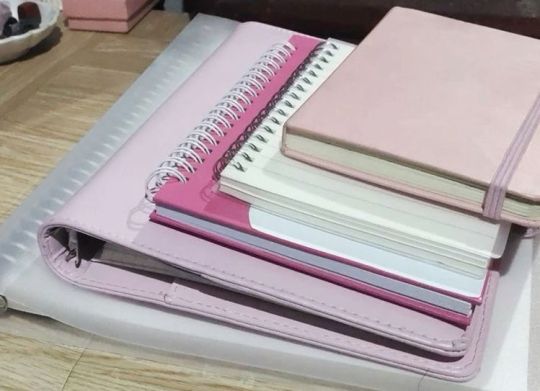
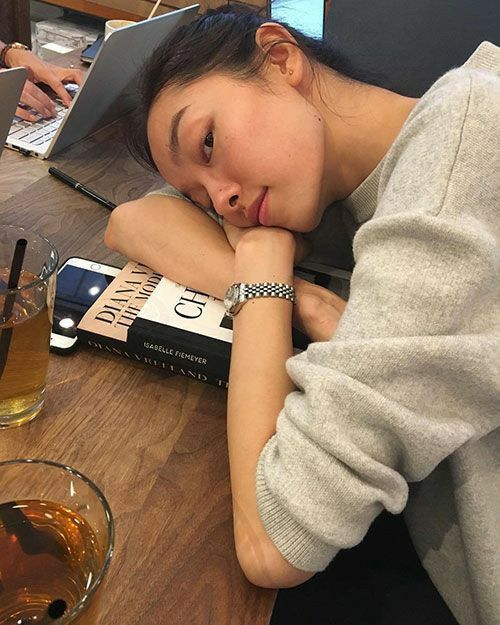
Below are some habits and rules to keep in mind throughout your studies and some tips that will elevate your learning experiences.
☆ Setting boundaries and learning to say no
It is always easy to say yes and join every social event that one is invited to, however its crucial to consider your own personal life and the consequences of your decisions. Hanging out with friends is a needed event as a social creature, however it's better to exercise caution and know when to say "no" to focus on your own goals and dreams. Don't get pulled into the pace of others and focus on finding a routine and schedule that works for your own benefit.
☆ Being comfortable with your own company
You will find in uni that there are lots of times that you will spend alone, and maybe feel a little anxious that you're the only person who isn't constantly in the company of someone everyday like you maybe were in high school. However, realise that even the time to yourself is a time of value, and treasure those moments to focus and work on your own goals. It is easier to get lost and lose sight of your ambitions when with others who don't have the same aspirations as yourself. Use your own time to sit down and work out what you want to achieve and quietly put in the effort to win.
☆ Never being scared to ask questions
It can be quite daunting to ask questions in lectures, so I prefer to ask my questions during times that aren't forced into a short time interval, such as tutorials, office hours, and other forms of learning support that your university/college provides. This way there is no rush to answer my questions and take my time in working through concepts and ideas. Ask questions based on your own conclusions, questions that challenge current rules and perspectives. Think deeper into your lessons and seek to make use of every bit of information.
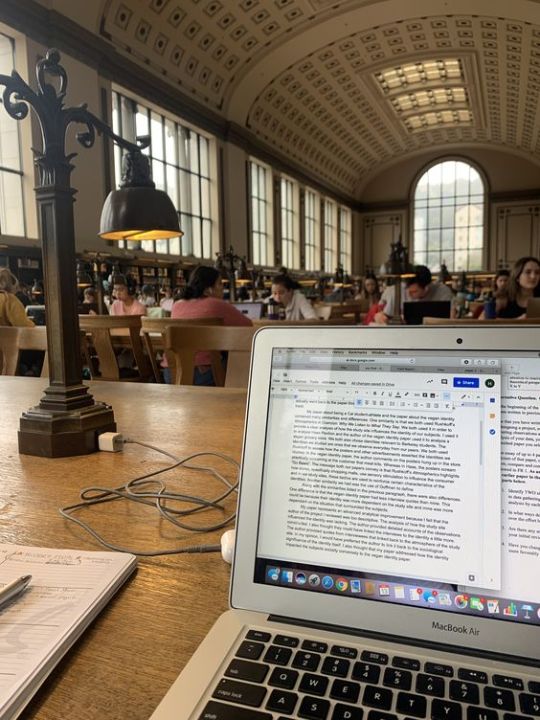
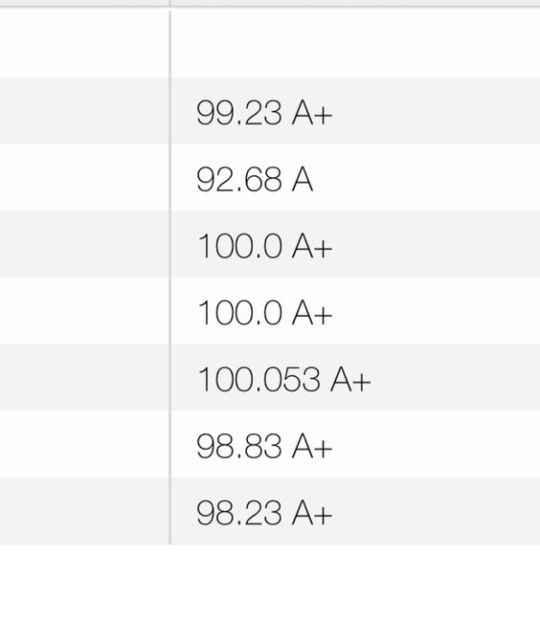
☆ Being curious
This is very much related to the point above, that being that personal interest really aids with the brains memory retention. The more things you approach with an enthusiastic attitude, the easier it is for your brain to remember and categorise. Having curiosity, even if it is forced, gives a great advantage where you seek to interconnect the information you learn with other data, and grow more networks of neurons that allows your brain to stay healthy and active.
☆ Initiating contact
Struggling with a theory or assignment? Great, it shows that you are actively trying to understand a concept and working your brain muscles. Now the best way to comprehend or complete what you are struggling with is to access support materials. Still difficult? Reach out. Your teachers, professors, tutors are all there for your benefit. Use them intelligently and squeeze every drop of assistance and support from them while they are still available to you.
☆Watching educational content to aid your studies
You can never lose from learning a bit more every day. However make sure to fact check and find your information from trusted and quality sources. In general, it's always a win to be educated in various topics from health, sciences, arts, humanities and more to gain a better understanding of ourselves, our world, and humanity.
For example, I watched a ted talk today, and here is my conclusions from my notes:
ੈ✩TedX: Why Reading Matters by Rita Carter
Summary:
☆Your brain needs a workout as much as your body. And reading fiction seems to be one of the best workouts you can get. (I recommend quality fiction, with that being classic literature because it genuinely exercises your mind with its intricate language techniques and diverse vocabulary)
☆Not only is it good for you, but it's also good for society as a whole because the brain is like a muscle: the more you force yourself through books to take other people's perspectives, to sympathise, to empathise with other people, the more empathetic a society we will have.
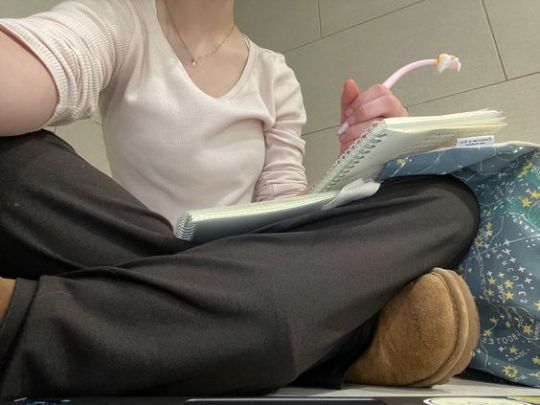
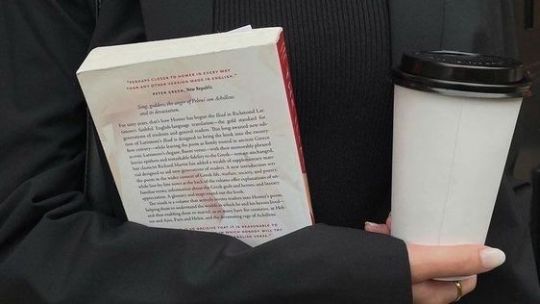
ੈ✩‧₊˚
good luck lovelies
~winter
ଘ(੭ˊᵕˋ)੭* ੈ✩‧₊˚
#university student#self concept#studyblr#study#studygram#study motivation#student life#student#studying#university#uniblr#education#personal growth#personal development#glow up#college#college student#aesthetic#college life#assignment#science#study techniques#study aesthetic#overachiever#divine feminine#manifestation#successmindset#it girl#pink pilates girl#high value mindset
438 notes
·
View notes
Text
The 7000 Spawn Conundrum .
Had a reply to a reply in regards to how nobody is talking about the consequences of releasing 7000 spawn into the Underdark.
So lets start a pot! rummage rummage rummage Ah! The Emperor's 7 Treasures it is! Black and green tea with rose and sunflower petals. Not sure why its called seven when there are only four things in it but, oh well what the hell.
"To be, or not to be, that is the question: Whether 'tis nobler in the mind to suffer the slings and arrows of outrageous fortune, or to take arms against a sea of troubles and by opposing end them."
William Shakespeare
That is the question, isn't it. To be the one who releases 7000 spawn into the Underdark and let them live, or not to be the one who releases 7000 spawn into the Underdark and destroy them.
WARNING: Game Spoilers, Topics of sex, Abuse, Murder, Torture and Adult themes and language. Not underage appropriate.
This is not fact. Just opinion based off my own and game experience. As always, how anybody cannon their relationships or behaviors is perfectly right! No blame, no shame, it's your game!
~~~~~~~~~~~~~~~~~~~~~~~~~~~~~~~~~~~~~~~~~~~~~~~~
And welcome to another round of difficult choices. How anybody decided this is through their own lens and filter and neither right nor wrong in their choosing.
Here is why I was ok with the decision to let them go.
Lets be honest about the dark impulses of humanity. You could release seven thousand humans and get the same outcome. No they are not biting people, well..some might be, but the "how" of how someone choses to unalive someone else is a moot point. The outcome is the same. Those aligned with destructive violence will choose destructive violence. You need only look out into our own world to see that truth.
So, you have 7000 vampire spawn on your hands. Do you kill them all out of fear for what a few might do? Or do you allow them to make their own choices and let fate decide?
For me, the issue with destroying the spawn was you are also destroying the ones who would not chose a life of evil intention. You are taking away their chance to make a life because their neighbor might be bad.
I have always hated the punish the whole for the act of the one mindset. I've been on the receiving end of that more than once and It is absolute equine grass byproduct.
Sebastion was a good example of this. He had been down there for 170 years and still had control of his mind. His first concern wasn't blood, but that his family and friends were gone.
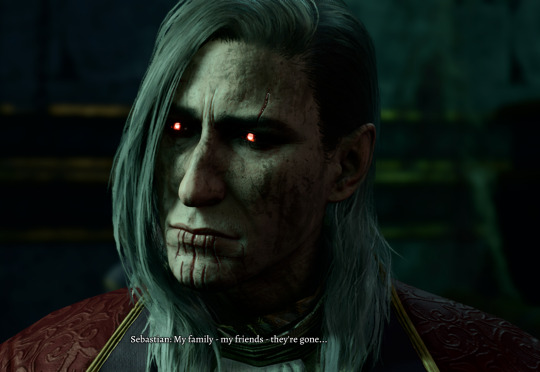
"My family-my friends-they're gone.."
He wasn't "mad" or craven. He wasn't snapping and rattling the bars of the cage like a feral animal to get to rip out anybody's throat. What he was was angry, tired and hopeless. And rightfully so. The fact that he could hold a cognitive conversation was key to me. They did not present as mindless beasts, they were just people suffering.
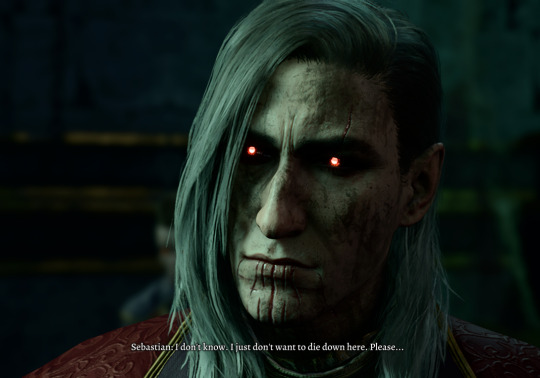
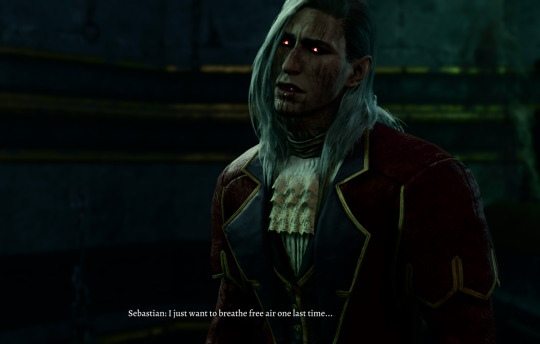
"I just know I don't want to die down here, please. I just want to breath free air one last time."
Now, I'm sure there were a few in there feral, but I don't think it was possible to open one door at a time and sort them all out. Opening the flood gates was the only option. So again, its a damned if you do, damned if you don't situation.
But there were a few hints as to if it was a good choice or not.
First, Astarion is unhappy about the decision when you talk to him about it the next day. He laments that they should have been given a chance to make the choice just as he had.
"But he called them feral and said they could cause incredible carnage. Why would he suddenly care? "
Because, deep down, he didn't actually believe that. Not for all of them anyway. Honestly given his ability to talk himself into things, he was absolutely creating justifications to make sacrificing them easier to bare if he went thought with the ritual.
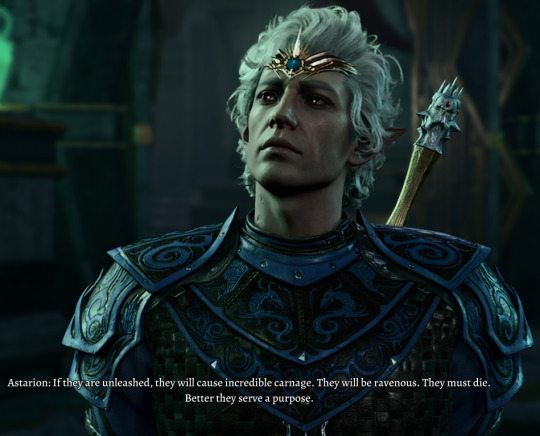
"Better they serve a purpose."
Hard to feel ok about killing something you consider sentient vs an mindless dangerous animal. And at that time, he was terrified of them. Imagine being surrounded by all the people you had ever wronged. How would you feel about it?
Second: When you find the children again, Gandrel (if you let him live in the swamp) and Kass thank you for letting them live.
This the most fucked up part of this whole situation. Those littles are now forever stuck at whatever age they are. Kass seems to have accepted it but Chessa is still battling her reality. But, as they age "mentally" they can eventually make a decision about if they wish to live as the are or leave for the astral plane.
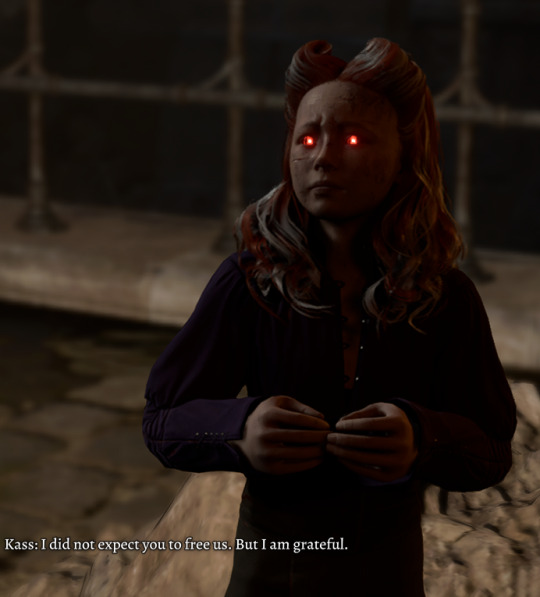
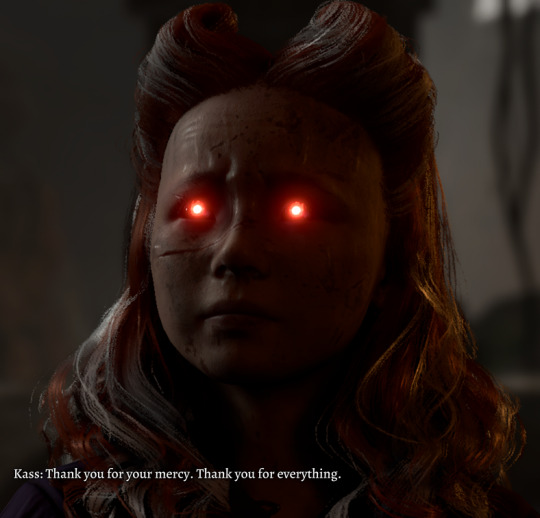
"I did not expect you to free us. But I am grateful. Thank you for your mercy..Thank you for everything."
Third, the epilogue. Through the letters you learn that the children are doing well with the use of animal blood and medicine to help them overcome their cravings. And the city of spawn are also doing well and are grateful to have the choice to walk their own paths.
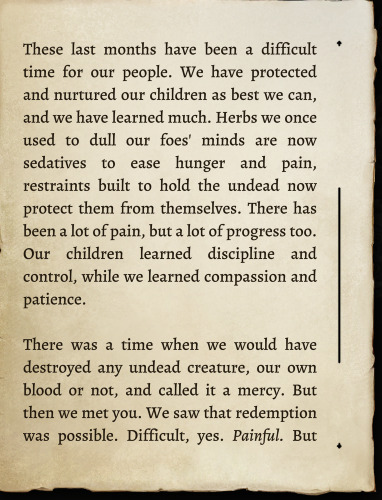
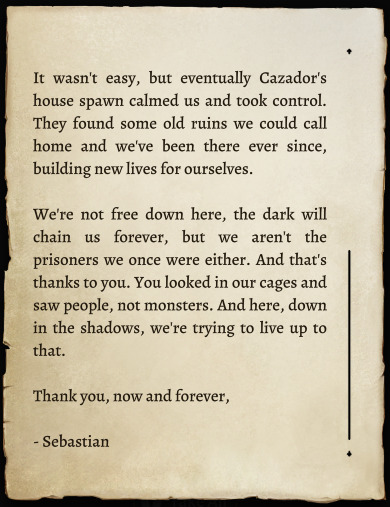
These are all read a positive outcomes to this difficult choice. The spawn are free to chose and build their own lives regardless of how any one else thinks they should live it. If they want to live, they live. If they want to die, they die. If they want to be monsters, they live as one. Etc ect. No choice is free of consequence. Even "good" ones.
"Pretty to think that is possible. But how would you feed thousands of vampires in a city?"
Not all seven thousand spawn made it. So how many are collected there is unknow. Over time a herd of Deep Rothe' can be shepherded and raised as blood animals. Like a Dairy farm but blood instead of milk. The larger the heard the more blood that could be produced over time.
Yes, I know, It's not vegan friendly but they are vampires loves. There is no plant option here.
The meat and products made from them could be sold to the surface. They could also establish trade agreements with the city butchers. A bit of gold for blood that would otherwise be dumped into the rivers and septic systems.
And we all know, given our fandom nature, there is no shortage of people who would get in line to be "pome de sang's" either.
Yes, I'm looking at all you kinky little juice boxes. You know who you are. I’m kidding of course. That would require alot of scrolls or a lot of clerics.
Anyway, feeding them would, in time, be sorted out in a way that is sustainable.
Also, they would not be adding to the population at an exponential rate. They are all spawn so they can't make more vampires. It wouldn't be everybody mating and birthing 100 or more new babies a year either. I know Dhampir's are suggested, but the occurrences would be rare.
Would there be pockets of corruption and gangs of violent ideals? Sure, those happen in any society. But as Leader of the city Astarion states they are delt with. Just like wolf packs, if you are putting the success and survival of the pack in danger with your bullshit behaviors your going to get removed from the pack.
"Ok, that's all well and good but what about the Underdark?"
Im sure there was an impact on the Underdark after the wave hit, but if you recall there are a plethora of gargantuan baddies down there and those spawn have not been training for months to battle them.
And you could warn the Myconids through the spores to be on the defense should they reach them. A couple well placed timmask spores and bibberbangs and the problem is solved. Ha ah! Booom!
The Duergar can fend for themselves as well as they are known to have impenetrable fortresses.
Any that make it to the City to cause problems will be handled by the vast amount of adventurers and hero's running around.
Honestly, if you are gong to loose a legion of vampires anywhere the Underdark would be the least impacted.
The point is there are pro's and cons to every decision. Peace and violence in every ecosystem.
Pick your hard.
And again, however one chose is right for how they viewed the situation within their universe.
Now, if you will excuse me, I'm late for the book club.
46 notes
·
View notes
Text
God the more I rewatch Etoiles fight the more it hurts. Hell the more I watch any parent fight their egg it hurts, from Max bawling over Trump to Quackity being basically insta killed by Tilin and Roiers anger as fake Bobby didn't attack them while Jaiden was filled with conflicting delusional happiness.
But especially this Etoiles fight yesterday puts the whole dinner into a much bigger perspective and I'd like to think that that's the reason why they put Phil in the fight with Etoiles.
They wanted him to hesitate.
They wanted Phil to be the burden during that fight because those things carry the names of his children, the children he'd burn the world down for. But they underestimated how strict Phil is with his trust and decision making to the point that even in egg form he treated them like they were monsters instead of his children.
Phil's special because while yes during Etoiles fight the code got better at adapting to an egg its still the same concept. He still had definite proof that that wasn't her but he still hesitated.
And I wanna go into the why of that, Phil's a hard-core player through and through and you will not get that out of his playstyle, you can see it on every multi-player server he's been on in the past because thats just how he plays the game. And as a hard-core player he probably has the most interesting relationship to mortality and is someone who can understand the eggs on a whole different level. But this means he's also INCREDIBLY aware of how much weight decision making carries and how even a single decision could decide over him staying alive or dying, he's used to that, it doesn't bother him anymore. That's why Phil is also someone who's very confident in his decisions, when he says he won't do or go to something because he knows the outcome then he means that and not even curiosity will get the better of him if he sees any form of danger or risk. If he tells Tallulah or Chayanne an instruction he expects them to follow it to a T because he gives those for good reasons each time (and both of his kids know that his instructions are teachings more than they are just him telling them to do something). And this confidence in his own decisions is why he fought those codes so relentlessly at the dinner, I'm convinced even if he hadn't gone back to get a picture of his kids he still would've fought these codes the same way. He trusts his experience and he trusts that he'll be able to deal with the consequences of his own decisions no matter if the outcome is good or bad. There's a reason why other players usually come to him for advice or when he spends time with someone he naturally falls into a teaching role, it's because he knows so much because he's had to know it all to survive in a world where death is inevitable.
Now why does that differ him from Etoiles? Well Him and Etoiles are good fighter's in their own ways. There's no doubt about that. But Etoiles is more upfront, he's smart during pvp and incredibly knowledgeable about statistics and strategy but ironically enough he still struggles to trust in his own words and decisions. He's someone who's quickly plagued by regret or doubts, it's why he praises Bad and Phil so much. Because both of them are incredibly headstrong and confident in their decisions just due to sheer experience. Etoiles just isn't even if his experience is just as good. And you can see this hesitancy even during the dinner fight, he didn't want to fight the codes until they hit him first. And it was Phil screaming to kill those things that made him set on actually attacking. Even when he got singled out later on and had a fake Tallulah follow him, he didn't attack until Phil confirmed Tallulah was safe with him. Etoiles trusts Bads and Phil's words a lot and holds them both in high regards when it comes to their opinions and decisions because he knows how much sheer experience those 2 carry. But during that fight yesterday he was alone, each of his actions couldn't be reassured because he was fighting alone and the actual Pomme wasn't there. He was terrified of making a wrong decision, even with Pierre reassuring him that it wasn't Pomme Etoiles couldn't bring himself to trust his own decision, even with their secret code not working Etoiles couldn't trust himself, even with seeing it carry the codes swords he couldn't trust himself. Even after the fight was over, after he saw Pommes bed with her sleeping tightly in it. He couldn't trust himself. He didn't feel like a winner to himself because his mind went into a spiral about of his decision was right or not, his mind screamed at him because he was sure he had fucked up royally and that's what makes it so interesting. Because Etoiles is a good fighter! And I'm pretty sure with equal gear he'd beat the 2 he holds in high regards to fighting skill a good amount. But he doesn't hold his own decision making very high, he's happy to be as help as a weapon that when he has to make a call he hesitates. And it didn't help that he had his daughters face stare at him while he had to make that important decision because while Phil loves his children just as much as Etoiles does, Phil never had to earn to be trusted with them. Phil's always been someone people trusted with the eggs while Etoiles had to earn his time with Pomme in promising he'll never let her die on his watch and will be careful beyond believe while he's with her.
It shows in the confidence of their decisions, and it's fascinating how much more it shows during these high tension moments. Etoiles is someone who struggles so much with the knowledge of failure and its what made his fight hurt so much more, because he was convinced he'd fucked up bad even after he saw her bed.
Just some food for thought about our codebreakers
#qsmp#qsmp etoiles#codebreakers#qsmp philza#qsmp code monster#textpost#void mumbling#just brrrrr pffff
501 notes
·
View notes
Text
"Created plurality helps some people, but some really only do it for fun or some kind of roleplay and I don't think that's okay."
That's a take I have encountered in a conversation. Let's talk about it.
(If there are misconceptions, feel free to notify me. The post is quite long and I could miss the point while speculating. The topic is very nuanced and every case can be discussed separately.)
Created plurality can be helpful. It can help you fight loneliness, created headmate can comfort you in difficult situation, created headmate can sometimes provide a new point of view. It can also be harmful, when a created headmate for some reason gets negative traits and/or their existence/behavior causes distress. Some people might use created plurality to make a headmate replace them.
But the general perception of created plurality is it being a positive experience, so let's focus on this branch and keep going.
Created plurality can be helpful, yes. When you create a headmate to help you, it means you're struggling with something.
But what if a person just makes a headmate... To look cool? For roleplay? For fun?
Firstly, why would it be cool, if we exclude "usefulness"?
In some cases it might be that a lot of one's friends are plural (note: it doesn't matter disordered or not), and plural-with-plural connection seems stronger than plural-with-singlet connection, so there appears a distance, and it's quite a logical (and, importantly, emotional) conclusion that being plural would restore the relationship. In some cases it might be a desire to have a connection with plural community due to lack of relationships with peers in real life. Common things build a connection, right? Created plurality may even seem cool with all the upsides I've already mentioned. So it can become a tool for bonding.
Secondly, why would one create headmates for roleplay?
This one is tricky. I guess it has roots in willomancy, when it became popular and it was a way to bring your favorite character (even your own OC) to life. Bringing connection with a character to a new level... Sounds like a tool for escapism for me.
Lastly... Why would one create headmates for fun?
Plurality is not something you meet every day. And I'm not talking about it being uncommon, no. Depression, for example, is discussed a lot and is known even among children (whether it's a good thing or not...) because society widely acknowledges it as an experience. There are books, films about depression. Plurality is not widely acknowledged. It's barely known. It's barely written in books or shown in films.
And when something is unknown, isn't it fun to try and explore? Also considering how many people talk about their positive experiences! It must be fun! It would also be very fun to tell friends about this unique experience!
... Sigh.
But rose-tinted glasses break when you look deeper in causes and consequences. Because creating a headmate means creating a sentient independent being. At first they highly rely on your effort and involvement. And later you will have to treat them as an equal, as a friend, not as a tool to reach the goal.
Want to look cool? It might stem from lack of self-esteem and the feeling of isolation from peers. But becoming plural in order to feel accepted in already small and unpopular community won't solve these problems.
Want to roleplay? It might stem from the need in escapism, which can also be a way to cope with stressful life situation. Created headmates rarely, very rarely become exactly like it was intended during the process. And you can't force them to change back. And if you once get bored of the play, good luck constantly dealing with a person you're not interested in because they can't go anywhere.
Want to just have fun? Creating plurality takes a lot of patience and mental work. When the decision is taken impulsively, the process can be stopped at any moment before a headmate fully forms, and I think it happens a lot with those people who expect quick results. And if someone makes it, but the experience doesn't seem fun anymore?
... Honestly, the reason for creating plurality barely matters. There's almost never one certain reason. There's a summary of different factors which lead one to making this decision.
What matters is how you treat your created headmate. A friend or a tool?
In the end, everything has upsides and downsides. For some people created plurality can be beneficial. For some people created plurality can be harmful. For some people it doesn't even work.
Created for fun?
I hope you and your headmate have fun together in this life.
24 notes
·
View notes
Text
I have thoughts about the Tiktok JK deleted
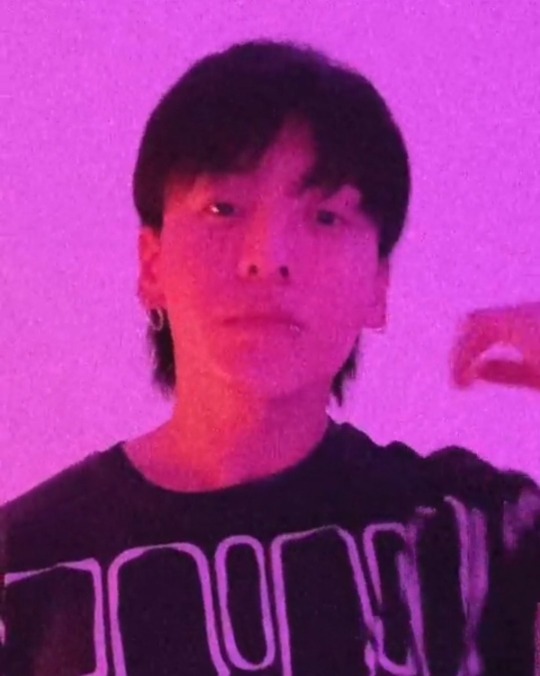
<<I realise its a few days ago now and you might be wondering 'what tiktok?' but I've been writing in snatches when I have a few minutes so it took a while. Anyway, here it is...>>
A few posts I've read have suggested JK did the silly>sexy Tiktok challenge backwards. That he did sexy>silly instead. That he was being random and funny.
I disagree.
What he did was unexpected, a little left of centre, and for the people who can read subtext, not random at all but very very clever.
I'll tell you why, (It may not be what you think) but first I need to vent about two things:
1. Give the man some credit. He knows what he's doing.
There are some who love JK but who see him as a naive innocent. He is not. He isn't a child or a himbo.
Saying he did the challenge just because it's trending, and he reversed the order of the content for a bit of a joke, is insulting to him as an artist. It would suggest he has no forethought or understanding of himself or his (global) audience, and his decisions are made on impulse with no idea of the consequences.
He's very intelligent and has plenty of experience with digital media and creating content. Besides being involved in producing complex visual narratives as part of BTS for the last ten years, he has directed and produced seven highly polished and professional GFC videos. And don't forget the MVs for Life Goes On. For the October issue of Vogue Korea he took on the role of Creative Director. That's a pretty big deal. So we can assume he knows what he's doing.
If he produces content in a particular way, it's because it enables him to communicate what he wants to communicate.
2. You may not understand the message. That doesn't mean there's nothing to understand.
A heads up to people who can't work it out... your inability to grasp meaning doesn't equate to 'no meaning exists'. Suggesting that people who recognise what he's doing are reaching or delusional is an insult to both the audience who can read this situation, and to Jungkook, who is sharing his message.
Consider a system of writing you can't decode. Lack of comprehension doesnt mean the writing is meaningless, it means you don't understand the language.
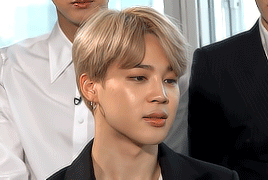
Even if you believe you understand what's being said, please recognise that context may play a role too, that it could reveal a richer and deeper message. Don't just assume the easiest (laziest) interpretation is correct.
(You may have guessed, someone suggested I was 'behaving like the cult' when I pointed out that JK's tiktok was more than being funny ... and now I'm mad 🤣)
Vent over. Now back to he topic at hand...
💜💛
What was he was really doing? And why is it not at all random?
Let's take a step back to recall what army has been saying about this...
Almost every interpretation i read suggests he reversed the order (silly>sexy becomes sexy>silly). The reason given is that his tiktok only makes sense if the order is reversed, and this idea is backed up by the caption saying "I go the other way".
But the 'reversed order' theory is based on a hereronormative perspective of what's sexy (and a stereotypical perspective of silly.)
So consider the content of his tiktok from a queer point of view...
For a man in a relationship with another man, the idea that he's with all those women is silly.
It's silly to believe he's got a girlfriend - or several. It's silly to think the womens' names in the song are relevant to him.
He posted this tiktok at a time when he's releasing music that fits the western pop norm of boy + girl, and when rumours of him dating several women at once are rife. The timing is not a coincidence and nor is the choice of background song for this.
All these assumptions and rumours are pretty silly, JK is telling us.
Now let's talk about the second part, the sexy part. Yes it may look silly on the surface, but we have seen him and Jimin make dorky faces at one another when they're flirting. It seems to be the visual equivalent of calling Jimin 'Jiminssssi'.
It's just another way they create distance and avoid 'getting caught'.
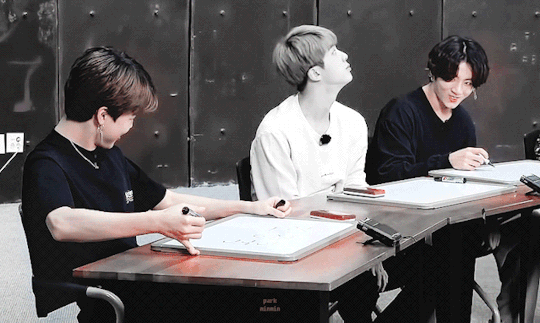
Maybe sexy for Jungkook actually is lying on the couch in your sweatpants making corny faces at your boyfriend.
Remember that he puts out 'stereotypical sexy' on command as part of his job so maybe that doesn't feel very sexy to him. Maybe that's work.
In my view (I know this is subject to interpretation) they've been together for years now. This is not the first flush of love. When you've been with a partner for a while, sex is (hopefully) more fun and less serious. Maybe it's about having the confidence to be wholly unselfconscious.
(My partner makes a Pepé Le Pew face at me when he's goofing. No, i don't know why either... 🤣🤷)

But wait, what about that caption?
What about 난반대로 간다?
My beautiful Korean friend (who sadly has zero interest or care about jikook) confirmed the literal translation:
"I go the other way"
"I take the opposite direction".
It's not "it goes the other way" or "this goes the opposite direction". He's referring specifically to HIMSELF.
Jungkook goes the other way.
But it's more than that according to my friend.
It's a bold statement:
"I don't follow the mainstream."
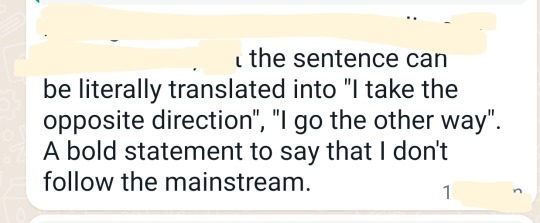
It reminds me of his tattoo ...
RATHER BE DEAD THAN COOL
He doesn't do things just because everyone else is doing them.
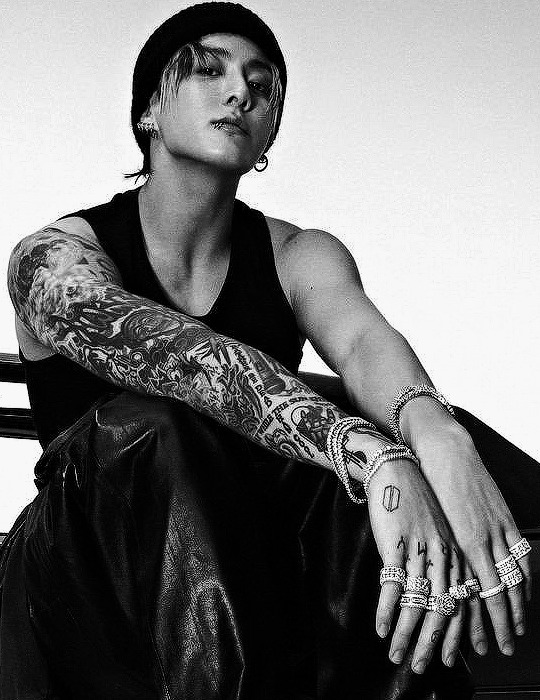
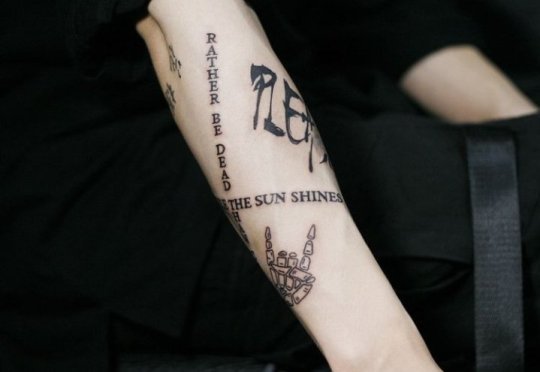
"I don't follow the mainstream."
OK. HOLD UP.
This is where it gets interesting.
Then why would he do something as mainstream as a trending tiktok challenge? Especially something as vapid as this challenge?
And why would he tell us DURING that Tiktok challenge that he DOESN'T follow the mainstream?
And then delete it.
Creating content takes time.
And we know he's a busy man.
He's about to release an album. He's doing live performances. He's prerecording for music shows. He's overseas right now... for the fourth time in a month! Does he have time for this??
And he DELETED it...
Did he just WASTE all that time?
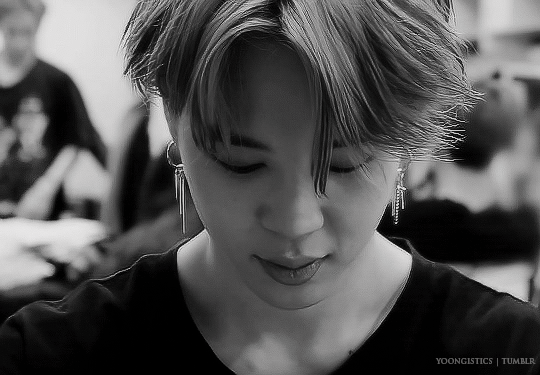
No, he did not.
He deliberately chose to do this.
He did it knowing ARMY studies every action, every video, and every media release.
He did it knowing ARMY would already have copied the video before he took it off his profile.
He said on Stationhead that he knows ARMY has it, and is sharing and posting it. He's FINE with that.
So he took the time to create and upload that video. He wants it out there.
He just doesn't want it on HIS page. That's an important part of the story.
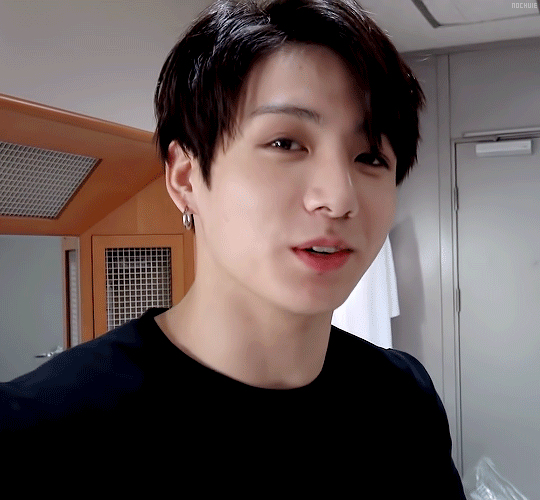
So lets go back to the caption.
"I take the opposite direction"
"I go the other way"
"I don't follow the mainstream."
*Said boldly* remember. It's a loud statement, captioning an otherwise pointless very mainstream trending challenge.
So if he's not referring to tiktok itself, or to uploading challenges, what could he be referring to?
...
...
There's only one thing left: Himself.
I take the opposite direction
I go the other way
I don't follow the mainstream
Essentially... I swing the other way.
There's no way a queer man would make that statement and not fully recognise the message he's sending.
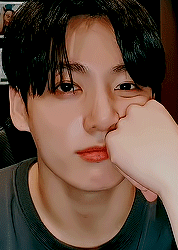
As for deleting the video, I'd say he knew it was too risky to leave on his profile, being a celebrity in Korea. He's managing his brand. Deleting it also gives him plausible deniability. He can say he made an error. As I said, he's very intelligent. He knows ARMY will see it and share it. He knows that those of us with a queer eye will hear the message loud and clear.
🏳️🌈🏳️🌈🏳️🌈 And we do hear it. 🏳️🌈🏳️🌈🏳️🌈
259 notes
·
View notes
Text
Only Friends: Can Ray be Redeemed? Is Sand the Solution?
I know Ray has upset a lot of people in Episode 8. I do find it really fascinating how quickly the tide has turned on him, especially when you compare his actions to those of our villains of the first arc: Boston and Top. Perhaps I'm in the minority, but I still choose to believe that Ray does care. He's hugely misguided but not heartless.
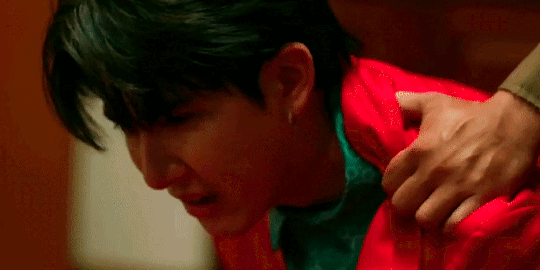
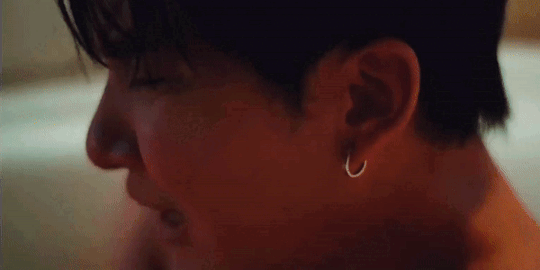
Let me firstly preface that none of what I'm about to say excuses Ray's behaviour but is an attempt to unpack why I still hold hope.
A child lost with no anchor
Ray is emotionally immature (which as cliché as it sounds, is a direct product of his upbringing - or lack thereof). He largely operates on basic needs, as a child would: 'I want. I need'. It's all based on serving the self. He seems wildly incapable of thinking very far beyond that. Like a child, he can barely take care of himself, let alone anyone else. He's pretty helpless on his own in a lot of respects. Most people grow out of this. Through knocks and hardship, we learn the world doesn't revolve around us and how to equip ourselves with healthy and appropriate means to navigate through life. Ray however, still seems to be stuck in his infantile box.
I often joke that Ray is a bit feral, but there is some truth to that. Ray's been left to his own devices for the majority of his life. So it's no surprise he's developed this 'me against the world' attitude which is volatile and defensive, but ultimately keeps him caged in said box.


These traits are abundantly apparent in his relationship with Mew. Ray is the vehicle for Mew's self-destruction, but all he sees is the exhilaration of having a 'partner in crime', someone to be in 'cahoots with'. Like a pair of naughty school kids getting into mischief, rather than an adult partnership. Ray is all about immediate gratification over long term fulfilment because (as children do), they don't possess the wisdom and experience to think ahead. Ray seems unable to grasp repercussions or consequences in his decision making. It's always act first, think second.
To put it simply, Ray hasn't been taught boundaries and how to respect them. He just gets criticised for crossing them which doesn’t help him learn. No one has had the patience to teach him why and how. To guide, to steer, to direct, to mentor. To educate rather than scold. Prevention rather than cure. As a result, everyone around Ray serves to clean up his messes rather than equip him with the ability to not create them in the first place. He falls into patterns of behaviour that no one has seriously attempted to break which has only amplified with adulthood. The longer those habits prevail, the harder they are to change.
Does Ray harbour ill-will or bad intent?
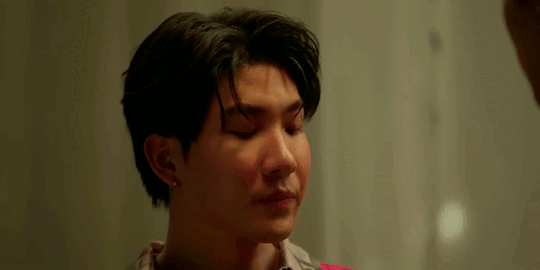
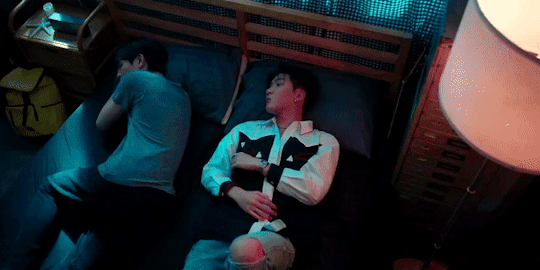
Is Ray the worst? In my opinion, no. (Not yet anyway - I might eat my words later, who knows). I've said this somewhere before but intent makes all the difference when judging someone's actions. Choosing to actively cause harm whilst being fully conscious of the impact versus triggering damage to occur as a symptom of your behaviour is vastly different. This is where Ray and Boston differ. Boston acts without remorse, he purposely and calculatingly makes choices that will cause the maximum degree of suffering. Whereas Ray's a loose cannon. He leaves a trail of destruction where he goes, due to a lack of control and means to channel how he feels in a constructive manner. Boston's victims are targets, whereas Ray's victims are collateral.
I don't think Ray means to purposely hurt or harm the people he cares about. Because in doing so, he'll push them away - which is precisely what he doesn't want. (Though saying that, Ray doesn't seem to give as much of a damn if it's people he isn't invested in, such as Top). Ray's world consists of what Ray needs. It's not that he doesn't care about a single person besides himself, he's just so wrapped up in his own needs to even gauge the bigger picture.
When others do point out to Ray that he's hurt them, he does tend to look guilty and taken aback, as if he's thinking, 'But I didn't know. No one told me. I had no idea my actions would cause you to be upset'. Painful levels of ignorance. But I also see a huge amount of internalised frustration. 'But why? Why didn't anyone explain this to me? How was I to know?'
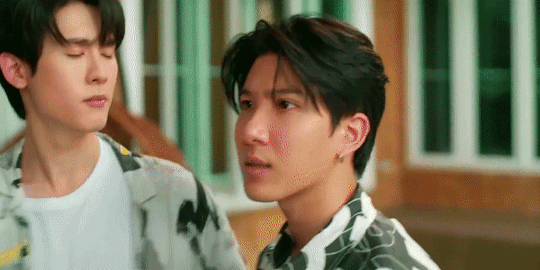

Ray is capable of showing remorse, of displaying guilt. He's not cold-blooded. Anyone who can demonstrate compassion is capable of redemption. Ray is seen to be genuinely appreciative and grateful when people are good to him. He's fiercely protective over people he cares about. Ray was also willing to jump in when Sand gets a call from his mum being in trouble.
One thing I do have to stress is the difference in Ray's demeanour when he's severely drunk/high versus when he's sober. His addiction tends to amplify his most primal desires, his most 'childlike' traits. The uglier sides of Ray presented in their worst light, set to maximum. The raging tantrums, the absurd and unpredictable demands, an explosive and dangerous impulsiveness. People often refer to addiction as a form of sickness, which is worth noting when the person under scrutiny is effectively not well.
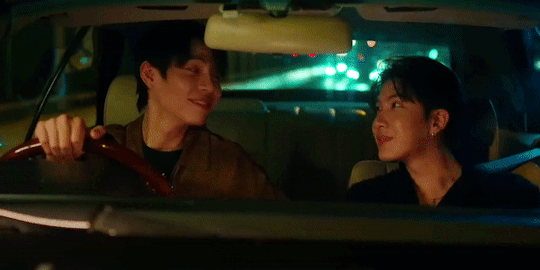
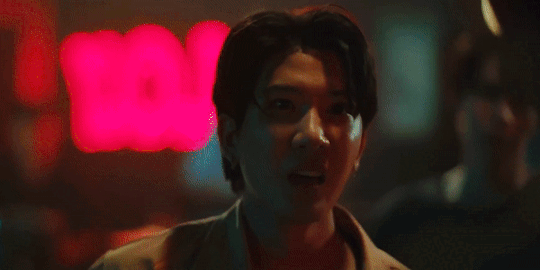
Learning by Example
Now let's talk about the huge importance of Sand in this equation.
Let me be clear - it's not Sand's responsibility to teach Ray how to grow up or behave more like a functioning adult. It's neither his duty to be a stand-in parent or caretaker. The unfortunate truth is that Ray doesn't have anyone in his life who plays that role. Who is the voice of reason. To keep him on the straight and narrow. In order to actually incite change, Ray needs to be receptive to whoever is trying to help him. We've seen he doesn't respond particularly well to the majority of people in his life. He's defensive with his father, his friends, deflective and pandering with Mew. The only person he's seen to show any signs of actually listening to and registering is Sand.


Whilst it's not fair on Sand, he might be the only person who has any real chance of encouraging healthy and positive growth in Ray. Because Sand loves Ray, he genuinely wants to see improvement for Ray's own good. I don't think it's a coincidence that we tend to see Ray's more endearing side when he's with Sand. His childlike qualities take on a sweeter, more harmless, playful tone.
He needs someone with an almost parental level of unconditional love to not give up on him, where others have thrown in the towel. Ray's character is essentially a personified cry for help. His mother was unable to cope. His father seems chronically exasperated and far too busy to actually be present. His friends have always seen him as bothersome and too much of a handful.
I personally don't want to write Ray off as a lost cause. Ironically, Sand may be the saviour he didn't ask for, but the one he really needs. Someone who can save him from himself.
#only friends#only friends the series#ofts#only friends meta#ray pakorn#ray x sand#sand x ray#raysan#sanray#khaofirst#firstkhao#khaotung thanawat#first kanaphan#ray is such a complex character that i could go on and on#khao just does such a great job of adding so many layers to him
202 notes
·
View notes